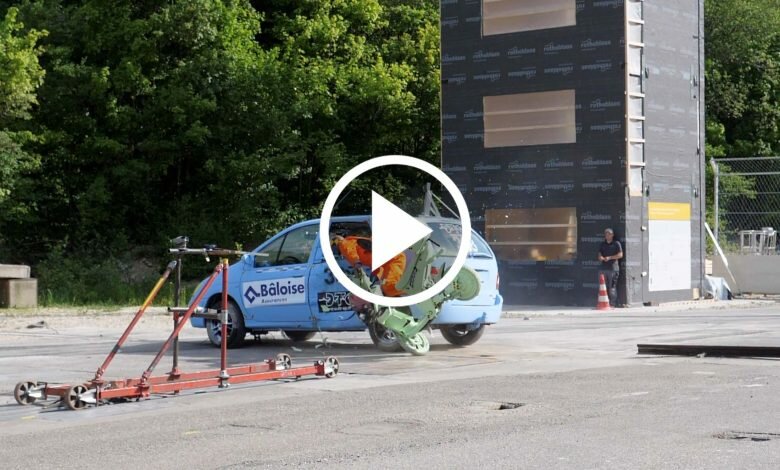Baloise Crash Test: When Modern Electric Vehicles Become a Threat

Basel, 20 May 2022. In recent times, e-bikes and e-scooters have become a common feature of the urban landscape. Often, the technology is later modified to allow vehicles to travel faster than the statutory maximum. Also, there is no legal requirement to wear a helmet when using a light motor-assisted bike with a maximum permitted speed of 20 km/h. But how does the outcome of an accident change if a cyclist on a light motor-assisted bike with a tuned motor travels at a speed exceeding the statutory limit and is involved in an accident? What protection can a helmet provide in such a scenario? Balois conducted several tests in collaboration with the Dynamic Test Center AG (DTC) and the Basel Traffic Police.
Light motor-assisted bikes that have been modified for higher speeds are becoming increasingly common on the road. Daniel Junker, head of vehicle experts at Balois, explains that today’s crash test series will recreate a variety of situations to raise awareness about electric bikes among road users.
The first crash test simulates the scenario of an e-scooter in a side-on collision with a car. The driver of the car misjudges the speed of the e-scooter, which has been tuned. The scooter rider is not wearing a helmet. After the test, the head of the Basel traffic police, Rolf Thomann, provides an analysis of the accident scene: in this situation, the driver was probably surprised by the speed of the e-scooter at a faster than allowed speed. The e-scooter rider will usually hit the car first with his head and then with his entire body, with the potential to cause serious injury as a result of the collision and subsequent fall. At such speeds, the rider would absolutely need to wear a helmet for safety.
Follow-up testing uses a fall impactor to demonstrate what impact a normal helmet can actually sustain. As part of this test, we dropped a standard bicycle helmet fitted with a head dummy drop onto a steel plate from a height of 1.5 meters at a speed of 19.5 km/h. The measurement taken from the dummy head should not exceed a specific level of bearishness. This test is part of the product approval test that any bicycle helmet sold in Switzerland must pass. This ensures that the risk of head injuries in the event of a collision can be significantly reduced, says Sandro Caviezel of Dynamic Test Center AG.
The second crash test features the protagonist riding an e-bike that crashes through the door of a starting car. We know this scenario very well only with conventional bicycles. But riders of e-bikes are likely to travel at higher speeds, resulting in a greater impact on collisions. DTC’s Heinz Reber says whether or not the rider is wearing a helmet can make the difference between life and death in this type of accident.
At the end of the test series, Daniel Junker from Balois summarizes: Today’s crash tests highlight problems arising from the greater physical forces that are at work when light motor-assisted bikes travel at extreme speeds. It would also be appropriate to make wearing of helmets mandatory for these vehicles. Furthermore, we are seeing an increasing number of road-tuned vehicles that are capable of exceeding the statutory maximum speed for this type of vehicle. This means that manufacturers need to find ways to eliminate the potential for the technology to be modified for higher speeds.
If you would like to see the Baloise crash test in person, please send your contact details to
contact
Balois Group, Eschengraben 21, CH-4002 Baselia
Website: www.baloise.com
E-mail: /
Media Relations: Tel:
Investor Relations: Tel:
Baloise Group is more than a traditional insurance company. Society’s changing safety, security and service needs in the digital age are at the heart of its business activities. That’s why Baloise’s 7,900 employees focus on the wishes of their customers. The best possible customer service, along with innovative products and services, makes Balois the first choice for those who just want to feel safe. Located in the heart of Europe, with its head office in Basel, the Balois Group is a provider of prevention, pension, support and insurance solutions. Its main markets are Switzerland, Germany, Belgium and Luxembourg. In Switzerland, the group also operates as a specialized financial services provider, offering a combination of insurance and banking services. The Group provides innovative pension products to retail customers across Europe from its competence center in Luxembourg. The shares of Balois Holding Limited are listed on the main section of the SIX Swiss Exchange.




